Know the Tech. Lead the way.
Level 1-5 precisely explained
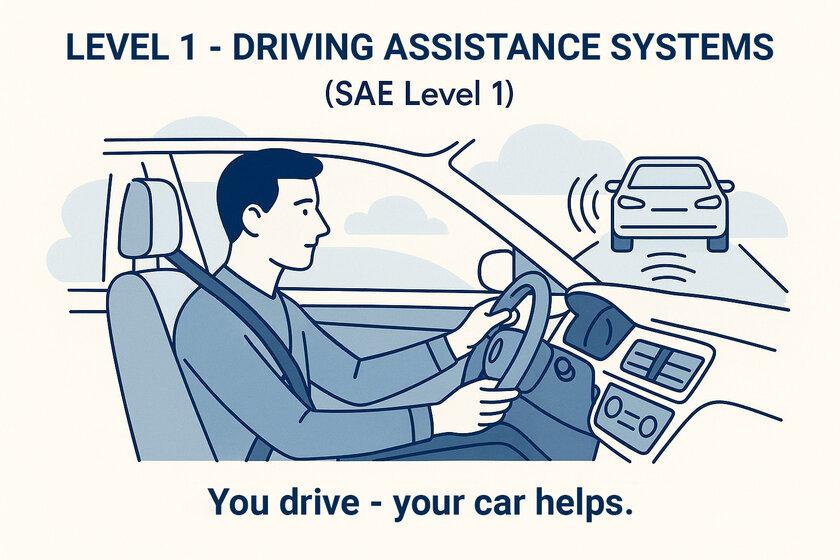
Driver assistance features like lane-keeping assist or adaptive cruise control provide support – but full responsibility remains with the human driver.
“You drive. Your car supports.”
The vehicle can steer and brake simultaneously – ideal for highway or traffic jam scenarios. The driver must stay alert and ready to intervene at any moment.
“The system takes control – but you remain responsible.”
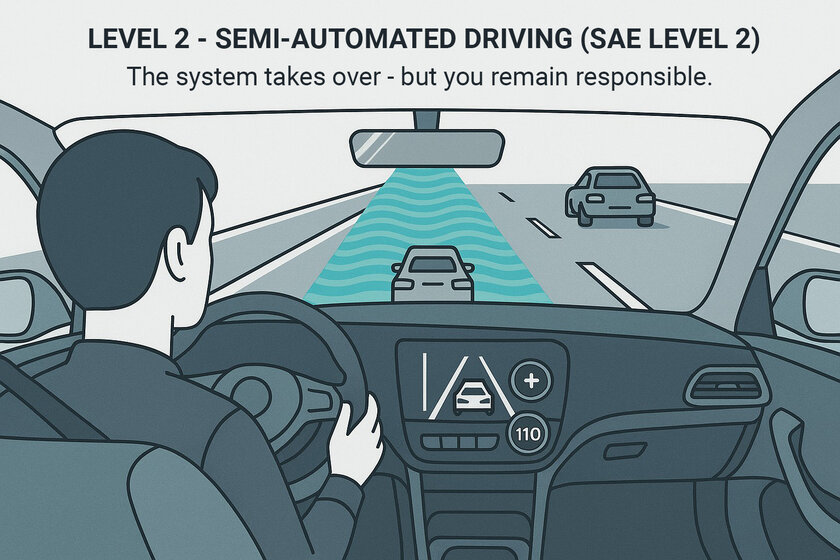
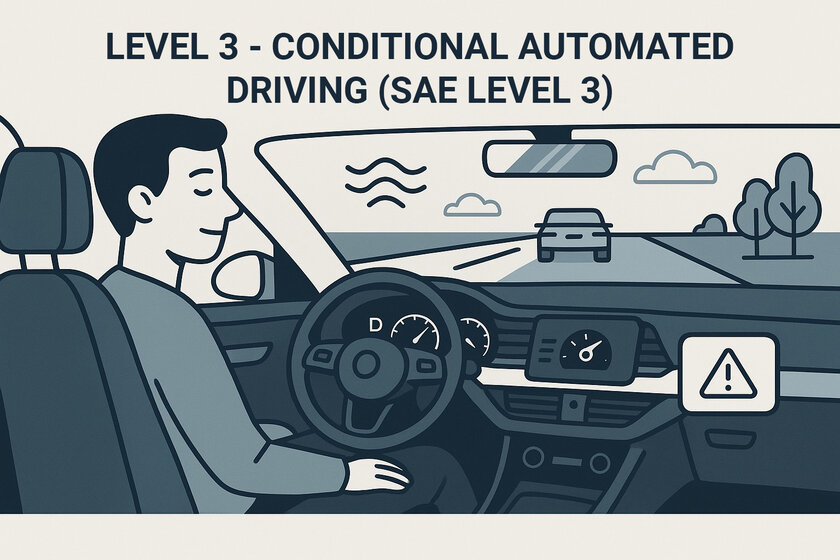
Under clearly defined conditions, the vehicle temporarily takes over driving. Still, the driver must be ready to retake control if necessary.
“You can relax – but not for too long.”
Level 4 systems operate fully autonomously within defined Operational Design Domains (ODDs) – such as campuses, test tracks, or urban shuttles.
Technical Requirements:
- Redundant Drive-by-Wire architecture (Safety-by-wire©)
- ISO 26262 ASIL D & ISO 61508 SIL3 compliance
- TÜV-certified control system
- OEM-ready sensor integration for perception
“The vehicle takes over - reliably and safely.”
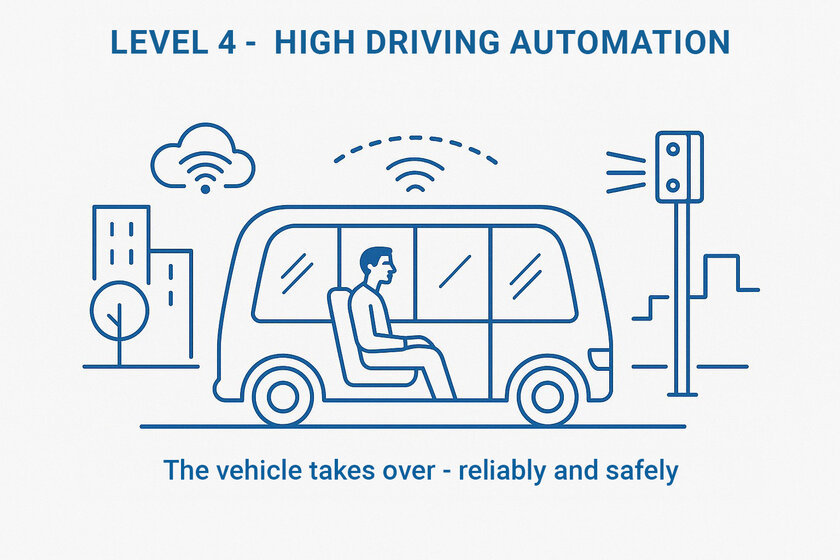
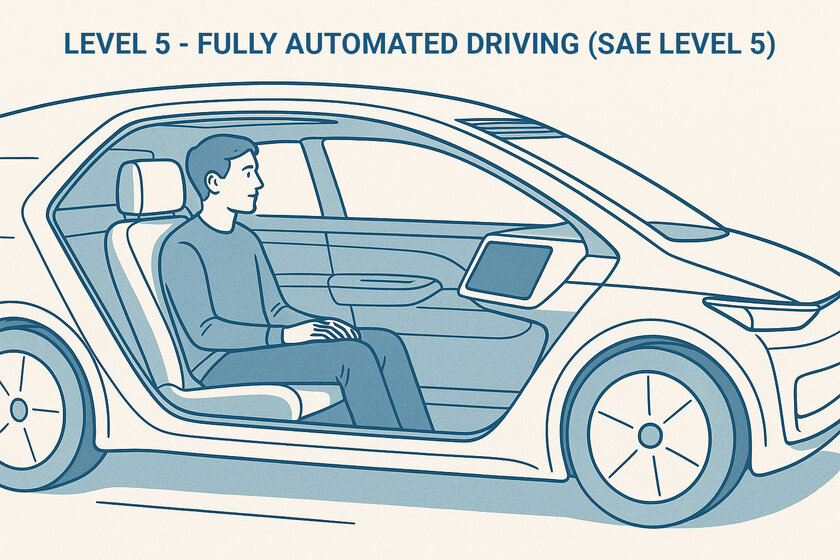
SAE Level 5 vehicles drive fully independently under all conditions – globally, in any weather, without human input.
Technical Requirements:
- Fully redundant control system (Safety-by-wire©)
- Platform-independent hardware for land, sea, and air
- Compatibility with diverse sensor stacks and navigation tools
- High-availability control (fail-operational)
"No steering wheel. No pedal. No compromises."
Advanced Topics & Insights
Autonomous driving addresses multiple macro challenges:
- Driver shortages: Especially in logistics and public transport.
- Road safety: Over 90% of all accidents are caused by human error.
- Climate & efficiency: Less congestion, better fleet utilization, reduced emissions.
- Mobility for all: The elderly, children, people with disabilities – autonomy empowers them.
Quite literally: NX NextMotion provides a hardwired digital path from command to actuator. No servo pumps, no gears, no cables – instead: high-speed communication via Automotive Ethernet and SAFE-CAN A/B networks.
Why It Matters
- Freedom in design – no restrictions from shafts or hydraulics.
- Redundant safety – automatic error isolation and ECU switching.
- OTA-capable – remote updates and security patches.
- Autonomy-ready – a foundational technology for autonomous and teleoperated driving.
Bottom Line: If You Control Drive-by-Wire, You Control the Future
NX NextMotion is no prototype. It’s certified, road-tested, and built for Level-5 autonomy. This isn’t a concept. It’s real. And those who master this technology will shape the next generation of intelligent, self-driving mobility.
Agriculture
- Autonomous tractors for precise, 24/7 operations
- Electronic implement control and centimeter-level lane accuracy
- Lighter vehicles reduce soil compaction and increase yield
Construction & Mining
- Remote-controlled machinery in hazardous zones
- Automated grading and precision control in confined spaces
- Reliable performance under extreme temperatures and conditions
Public Transport
- Autonomous shuttles for urban and suburban routes
- Smooth steering and braking improve safety and rider comfort
- Higher fleet availability through around-the-clock operations
Logistics & Fleet Management
- Platooning: trucks follow a digitally piloted lead vehicle
- Fuel savings through aerodynamic efficiency
- Reduced driver demand – one operator, multiple vehicles
Accessibility & Inclusive Mobility
- Custom controls: joystick, speech input, HMI interfaces
- Barrier-free configuration via programmable signals
- Semi- or fully autonomous modes enable true independence
Conclusion: Drive-by-wire is not an optional extra. It is a duty for the future.
If you want to operate economically, sustainably and safely in the long term, you need drive-by-wire. NX NextMotion provides the platform - certified, retrofittable, platform-independent. From tractors to urban people movers.
Mobility was yesterday. Motion intelligence starts today.
Every day, 3,700 people die on the roads.
That's not a typo. 3,700 fatalities - per day. More than from malaria, armed conflicts or natural disasters. Every year, over 1.35 million people are killed and more than 50 million injured.
And almost all of these victims are preventable - because over 90% of all accidents are man-made: distraction, fatigue, alcohol, overestimation. People are the safety risk. The machine is the solution.
What are the benefits of drive-by-wire and autonomy worldwide?
- In India: Reduction of fatal school bus accidents in chaotic traffic
- In Africa: Electronically controlled micro-fleets for the last mile
- In South America: Smart buses that connect slums with cities - safely and cheaply
- In the USA & EU: Relief for overcrowded emergency rooms, reduction of insurance premiums and CO₂ emissions
What if we DON'T act?
- Millions more deaths - even though the technology is available
- Societies that consciously decide against efficiency, inclusion and safety
- An ethical failure on a global scale
Conclusion: The world has a mobility problem. Arnold NextG provides the answer.
NX NextMotion is the platform for global safety: certified, scalable, retrofittable - from Mumbai to Munich, from Bogotá to Boston.
The future is autonomous. Anything else is irresponsible.
FAQs Drive-by-wire
Drive-by-wire replaces mechanical or hydraulic control connections in the vehicle with electronic signal transmission. This means that instead of a mechanical steering rod or hydraulic cylinder, electronic control units and sensors are used to precisely execute the desired driving maneuvers. NX NextMotion from Arnold NextG acts as a central control node that integrates drive, steer and brake-by-wire functions into a single system. It uses a software-controlled safety concept that is fully redundant (ASIL D/SIL3-compliant) and supports over-the-air updates as well as all common interfaces such as CAN-FD, CAN-XL and Automotive Ethernet.
NX NextMotion combines Drive, Steer and Brake-by-Wire in a standardized, modular safety controller. While other suppliers such as ZF or Danfoss rely purely on steer-by-wire components, Arnold NextG provides a complete, highly safe control platform for all motion axes relevant to driving. The system has fourfold redundancy, physically separated communication paths, galvanically decoupled power supplies and heartbeat-controlled failover management. It is also scalable for a wide range of vehicle platforms - from autonomous shuttles to off-highway vehicles - and enables safe driving operation even if several subsystems fail.
NX NextMotion is ideal for autonomous commercial vehicles, special municipal vehicles, agricultural technology, robotaxis and rehabilitative mobility solutions. In autonomous trucks, drive-by-wire ensures precise lane keeping, efficient platooning and safe remote control. In agriculture, it enables adaptive control of equipment on changing terrain. Shuttles benefit from the complete redundancy of the systems and disabled vehicles receive barrier-free joystick operation. Common to all fields of application is the ability to save on mechanical components, reduce maintenance costs and at the same time achieve a higher level of functional reliability.
The safety concept is based on a four-stage redundancy approach that includes hardware, software, communication and power supply. At the heart of the system is continuous self-monitoring using heartbeat logic and watchdog mechanisms. If a control path fails, the system automatically switches to a backup channel without interrupting the control function. The system detects both single and multiple faults and responds with graduated degradation modes that always maintain vehicle safety. This means that NX NextMotion is also suitable for fully driverless vehicles (Level 5) that no longer allow manual intervention.
NX NextMotion complies with all relevant functional safety and cybersecurity standards in the automotive sector. These include ISO 26262 (ASIL D) for electrical and electronic systems, ISO 21434 for cyber security, IEC 61508 (SIL3) for industrial applications and ECE-R13 and R79 for brakes and steering. In addition, the system is TÜV-certifiable and can be transferred to series production in accordance with the IATF 16949 standard. This broad basis of standards enables road-legal integration into a wide range of vehicle types.
Integration into vehicle platforms takes place via standardized interfaces such as CAN-FD, CAN-XL, Automotive Ethernet or LIN. Analogue and digital inputs and outputs as well as diagnostic interfaces according to UDS and DoIP are also supported. REST-API, UDP and MQTT are available for connection to cloud systems or human-machine interfaces (HMI). The architecture is OTA-capable and supports differential software updates via secure TLS channels with digitally signed firmware packages.
NX NextMotion protects itself with a combination of secure boot, hardware trust anchors, end-to-end encryption (TLS 1.3) and rollback-capable update management. The system also implements real-time logging and intrusion detection logic that recognizes unusual access patterns. Access to security-critical control functions is only possible via signed keys that are dynamically managed and rotated.
Drive-by-wire systems such as NX NextMotion enable the complete separation of human and vehicle control. They reduce mechanical complexity, open up new possibilities in vehicle design and allow the implementation of autonomous functions at SAE level 4 and 5. They form the basis for new business models such as “Vehicle-as-a-Service”, remote-controlled logistics or modular platform concepts. They are essential for European technology leadership, as the strategic roadmaps of the German government and the EU also show.



